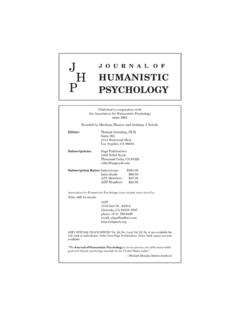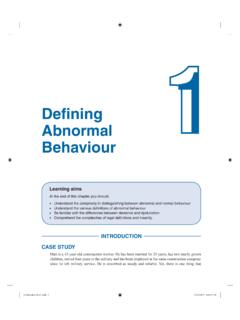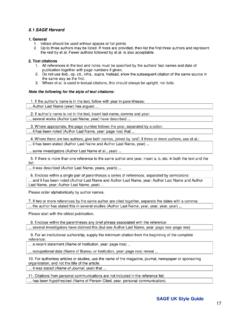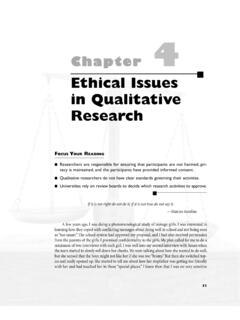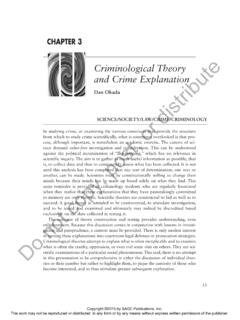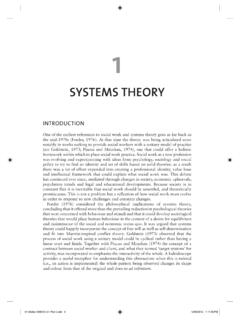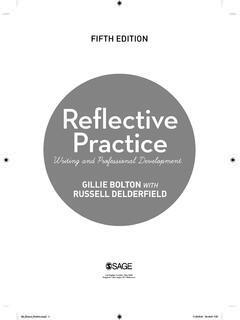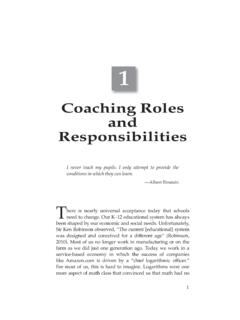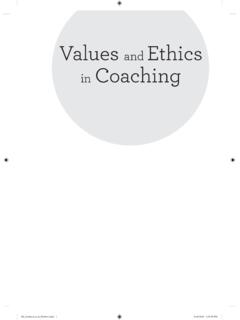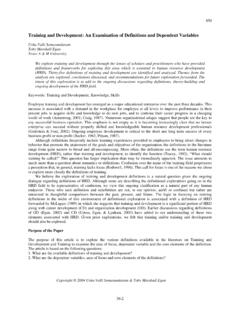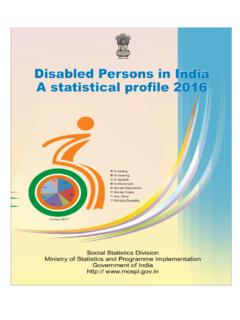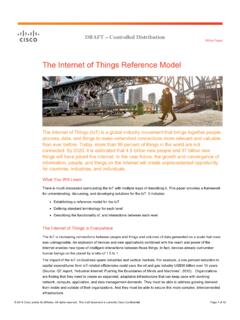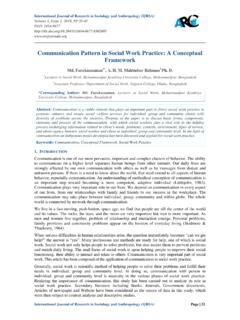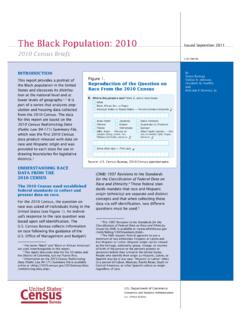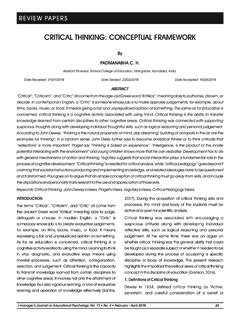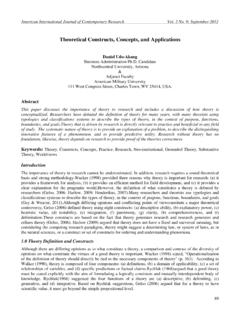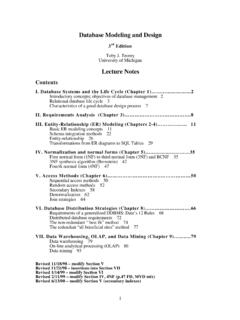Transcription of Linda M. Crawford A
1 35At the outset of planning your research, you set the study into a framework that justifies the study and explains its structure or design. This framework is like a foundation for a house. It provides the essential support for the study components and also clarifies the context of the study for the reader, much like a house blueprint. By constructing this framework, you not only justify and explain the study to others but also check your own understanding of the need for the study, how the study is conceived, what knowledge it will add regarding the topic, and how the elements of the study design align with the problem identified for the chapter builds on the philosophical foundations presented in Chapter 2 by addressing the framework for a research study.
2 One of the difficulties for new researchers in developing a framework for a study is that conceptual and theoretical frameworks are defined and described differently by different authors, and the definition of what is considered a study framework may vary by institution. This chapter explores those various definitions to provide a spectrum of understanding of conceptual and theoretical frameworks. This chapter also provides the purpose of the conceptual framework, sources from which these frameworks are derived, and how conceptual frameworks are presented. Given the discrepancy in definitions of conceptual and theoretical frameworks, the term conceptual framework will serve as the overriding term for the chapter and will be differentiated from the term theoretical framework.
3 Finally, some guidance in how to approach the conceptual and theoretical frameworks for your study is DEFINITIONS OF conceptual FRAMEWORKSB efore exploring the various understandings of conceptual frameworks in depth, it is helpful to com-pare multiple definitions of the term. Some authors view conceptual and theoretical frameworks as synonymous. Interestingly, some research design authors do not provide description or definition of either conceptual or theoretical frameworks, even if they discuss theory; for example, see this omission Linda M. CrawfordCONCEPTUAL AND THEORETICAL FRAMEWORKS IN RESEARCH3 Copyright 2020 by SAGE Publications, Inc. This work may not be reproduced or distributed in any form or by any means without express written permission of the publisher.
4 Do not copy, post, or distribute36 Part I Foundations in Research Designin Leedy and Ormrod (2016). Please note that this omission from texts does not justify excluding a conceptual framework from a study. A conceptual framework provides the orientation to the study and assists both the researcher and the reader in seeing how the study contributes to the body of knowledge on the topic, how elements of the study align, and how the study design and methodology meet rigorous research standards. In summary, a conceptual framework is incredibly displays various authors definitions of conceptual framework. A concep-tual framework may be defined broadly as theory or literature review, or it may be defined more narrowly as the factors and variables addressed in a study (Maxwell, 2017; Miles, Huberman, & Salda a, 2014).
5 Essentially, all definitions of concep-tual framework provide a context for the study, but the scope of that context varies among and RigganRavitch and Riggan (2017) presented the most comprehensive understanding of conceptual framework. Indeed, they devoted an entire book to the topic. Their main point was that a conceptual framework is an argument for the study and that argu-ment has two parts. First, the argument establishes the importance of and intended audience for the study. Second, the argument demonstrates alignment among research questions, data collection, and data analysis, as well as the use of rigorous procedures to conduct the study. They posited that the conceptual framework both TABLE DEFINITIONS OF conceptual FRAMEWORKSA uthor(s)DefinitionRavitch and Riggan (2017) An argument about why the topic one wishes to study matters, and why the means proposed to study it are appropriate and rigorous.
6 (p. 5)Miles et al. (2014) [An explanation], either graphically or in narrative form, [of] the main things to be studied the key factors, variables, or constructs and the presumed relationships among them. (p. 20)Maxwell (2013) The actual ideas and beliefs that you hold about the phenomena studied, whether these are written down or not; this may also be called the theoretical framework or idea context for the study. (p. 39)Marshall and Rossman (2016) The first major section of the proposal the conceptual framework demands a solid rationale. In examining a specific setting or set of individuals, the writer should show how she is studying instances of a larger phenomenon. By linking the specific research questions to larger theoretical constructs, to existing puzzles or contested positions in a field, or to important policy issues, the writer shows that the particulars of this study serve to illuminate larger issues and therefore hold potential significance for that field.
7 (p. 6)Copyright 2020 by SAGE Publications, Inc. This work may not be reproduced or distributed in any form or by any means without express written permission of the publisher. Do not copy, post, or distributeChapter 3 conceptual and Theoretical Frameworks in Research 37informs and describes the development of research questions, design selection, data collection, data analysis, and presentation of , Huberman, and Salda aA major contribution to the idea of conceptual framework presented by Miles et al. (2014) is the graphical representation of the conceptual framework, which will be explored later in this chapter. They promoted spending significant time in develop-ing and representing the conceptual framework. That process encourages a closer assessment of how a study s variables are related, how study participants are charac-terized, and how data collection instruments are (2013) discussed conceptual frameworks in relation to qualitative research design.
8 For Maxwell, the conceptual and theoretical frameworks are synonymous. Maxwell presented the terms as synonymous because he viewed the conceptual framework as presenting a theory of the phenomenon under investigation (p. 39). A major point of Maxwell s contribution is that the researcher must build, or con-struct, the conceptual framework from personal experience, prior research, and pub-lished theory into a coherent representation of the and RossmanMarshall and Rossman (2016) described conceptual framework as providing a ratio-nale for the study. The idea of rationale is close to Ravitch and Riggan s (2017) view of conceptual framework as an argument for the study. Marshall and Rossman also emphasized the importance of grounding a conceptual framework in the literature published on the topic under definitions demonstrate the importance of the relationship of the conceptual framework to the roots of the study purpose and the alignment of study parts.
9 They also indicate ways that a conceptual framework makes the construction of a study clearer, cleaner, and more straightforward. However, another consideration is how researchers define the term theoretical framework, particularly in relation to the conceptual DEFINITIONS OF THEORETICAL FRAMEWORKSThe definitions of conceptual framework are confounded by the fact that some authors do not differentiate between conceptual and theoretical frameworks. Maxwell (2013), Robson and McCartan (2016), and Merriam and Tisdell (2016) consider the terms synonymous. Anfara and Mertz (2015) do not explicitly relate conceptual and theoretical frameworks, but they imply a synonymous relationship between them. Some authors (Marshall & Rossman, 2016; Miles et al.)
10 , 2014) offer no discussion of the relationship between conceptual and theoretical 2020 by SAGE Publications, Inc. This work may not be reproduced or distributed in any form or by any means without express written permission of the publisher. Do not copy, post, or distribute38 Part I Foundations in Research DesignMerriam and Tisdell (2016) defined theoretical framework as the underlying struc-ture, the scaffolding or frame of your study (p. 85), which seems close to some of the definitions of conceptual framework provided earlier. Anfara and Mertz (2015) defined theoretical frameworks as any empirical or quasi-empirical theory of social and/or psychological processes, at a variety of levels .. that can be applied to the understandings of phenomena (p.
